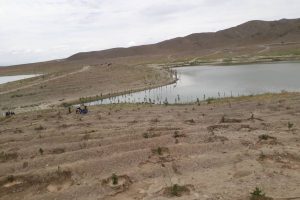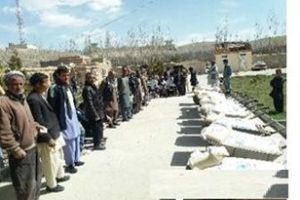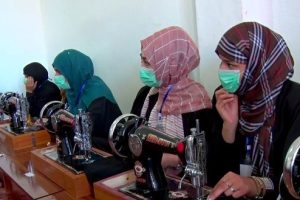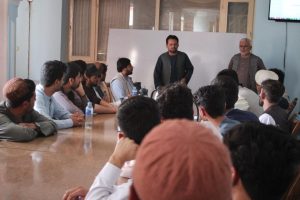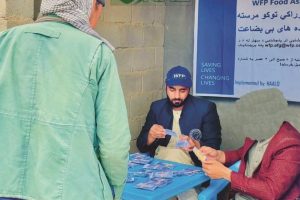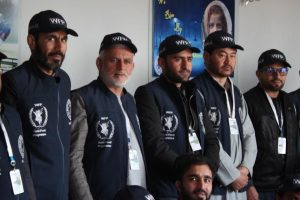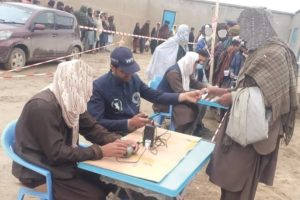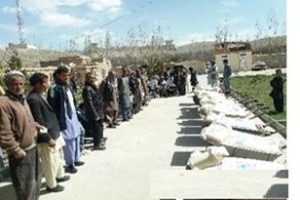HAALO’s WASH (Water, Sanitation, and Hygiene), Shelter, Hygiene, and Non-Food Items (NFI) Program focuses on providing life-saving support and building resilience in communities affected by emergencies, natural disasters, and chronic poverty in central, southern, and southeast region provinces. The program is designed to improve access to safe water, sanitation, and hygiene (WASH) services, provide adequate shelter for vulnerable populations, and distribute essential non-food items to help families recover from crises and enhance their living conditions.
Program Components:
- Water, Sanitation, and Hygiene (WASH):
- Access to Clean Water: HAALO constructs and rehabilitates community water points, including boreholes, wells, and piped water systems, to provide safe and reliable drinking water for communities. This reduces the time spent collecting water and minimizes the risk of waterborne diseases.
- Sanitation Infrastructure: The program focuses on building and improving sanitation facilities, such as latrines and toilets, in communities, schools, and health centers. This helps to reduce open defecation, improve hygiene practices, and prevent the spread of disease.
- Hygiene Promotion and Awareness: HAALO conducts hygiene awareness campaigns to educate communities about the importance of handwashing, safe water storage, and proper sanitation practices. These campaigns promote behavior change to reduce the risk of diseases such as cholera and diarrhea.
- Provision of Hygiene Kits: The program distributes hygiene kits, which include essential items like soap, water containers, and sanitary materials, to vulnerable families. These kits help maintain personal hygiene and prevent disease transmission in crisis situations.
- Shelter Support:
- Emergency Shelter Assistance: HAALO provides temporary shelter solutions for families affected by natural disasters, conflict, or displacement. This includes distributing emergency shelter kits that contain tarpaulins, poles, and tools to help families construct temporary shelters.
- Transitional and Permanent Shelters: In areas where long-term displacement or recovery is required, HAALO supports the construction of transitional and permanent shelters. These shelters are designed to be durable, weather-resistant, and culturally appropriate, providing families with a safe and secure living environment.
- Shelter Rehabilitation: For families whose homes have been damaged but are salvageable, HAALO provides materials and technical assistance for shelter repair and rehabilitation. This includes the provision of roofing materials, bricks, and other construction supplies to restore homes.
- Non-Food Items (NFI) Distribution:
- Essential Household Items: HAALO distributes critical non-food items to families in need, including blankets, mattresses, cooking utensils, and clothing. These items are vital for maintaining a basic standard of living, especially in the aftermath of disasters or during periods of displacement.
- Winterization Kits: In cold-weather areas of Ghazni province, HAALO provides winterization kits that include warm clothing, blankets, and fuel-efficient stoves. These kits help vulnerable families, especially children and the elderly, to survive harsh winter conditions.
- Kitchen and Cooking Sets: The program ensures that displaced or disaster-affected households receive essential kitchen items like pots, pans, plates, and cutlery, enabling them to cook and maintain nutrition standards even in emergency settings.
- Hygiene and Sanitation Education:
- Community-Led Total Sanitation (CLTS): HAALO promotes Community-Led Total Sanitation approaches that engage communities in identifying and addressing their own sanitation challenges. This participatory process encourages communities to take ownership of sanitation improvements, such as the elimination of open defecation.
- School Hygiene Programs: In collaboration with local schools, HAALO implements hygiene education programs that teach children the importance of handwashing, personal hygiene, and maintaining clean school environments. These programs include the installation of handwashing stations and the distribution of hygiene supplies.
- Menstrual Hygiene Management (MHM): HAALO focuses on improving menstrual hygiene management for women and girls by providing sanitary products and raising awareness about menstrual health. This reduces stigma and ensures that girls do not miss school due to lack of access to sanitary products.
- Emergency Response and Preparedness:
- Rapid WASH Response: In the event of emergencies such as floods, droughts, or conflicts, HAALO mobilizes rapid WASH responses to ensure that affected populations have immediate access to clean water and sanitation facilities. Emergency water trucking, mobile latrines, and distribution of water purification tablets are common components of the response.
- Shelter and NFI Emergency Kits: HAALO prepares and stores emergency shelter and NFI kits to ensure a quick response to crises. These kits are pre-positioned in high-risk areas and can be distributed to affected families within hours of a disaster.
- Disaster Risk Reduction (DRR) and Preparedness Training: HAALO works with communities to enhance their resilience to future disasters by conducting training sessions on disaster preparedness, emergency shelter construction, and WASH practices. These efforts help communities to be better equipped to cope with future shocks.
- Collaboration with Local and International Partners:
- Coordination with Government and NGOs: HAALO collaborates with local authorities, international NGOs, and community-based organizations to ensure that WASH, shelter, and NFI interventions are well-coordinated and address the most urgent needs. This also includes working closely with the National Emergency Management Agency (NEMA) to respond to large-scale emergencies.
- Partnerships with Donors: The program is supported by funding from partners such as the World Bank (WB), World Food Programme (WFP), and other international donors, ensuring that resources are available to meet the needs of the most vulnerable populations.
- Monitoring and Evaluation (M&E) in WASH and Shelter Interventions:
- WASH Impact Monitoring: HAALO monitors the impact of its WASH interventions by tracking improvements in water access, sanitation coverage, and hygiene practices. This data is used to evaluate the effectiveness of the interventions and identify areas for improvement.
- Post-Distribution Monitoring (PDM): After distributing shelter materials and non-food items, HAALO conducts post-distribution monitoring to ensure that the items were received by the intended beneficiaries and are being used appropriately. Feedback from beneficiaries is used to refine future distributions and improve the quality of assistance.
Long-Term Goals and Sustainability:
HAALO’s WASH, Shelter, Hygiene, and NFI Program aims to not only provide immediate relief to vulnerable communities but also to build their long-term resilience against future crises. By improving access to clean water, sanitation, and durable shelter, and promoting better hygiene practices, the program contributes to healthier, more resilient communities. HAALO also integrates environmental sustainability and disaster risk reduction into its interventions, ensuring that communities are better prepared for future challenges.
Through its comprehensive approach to WASH, shelter, and NFI support, HAALO is committed to enhancing the well-being of vulnerable populations, reducing their vulnerability to health risks, and helping them rebuild their lives after crises.


